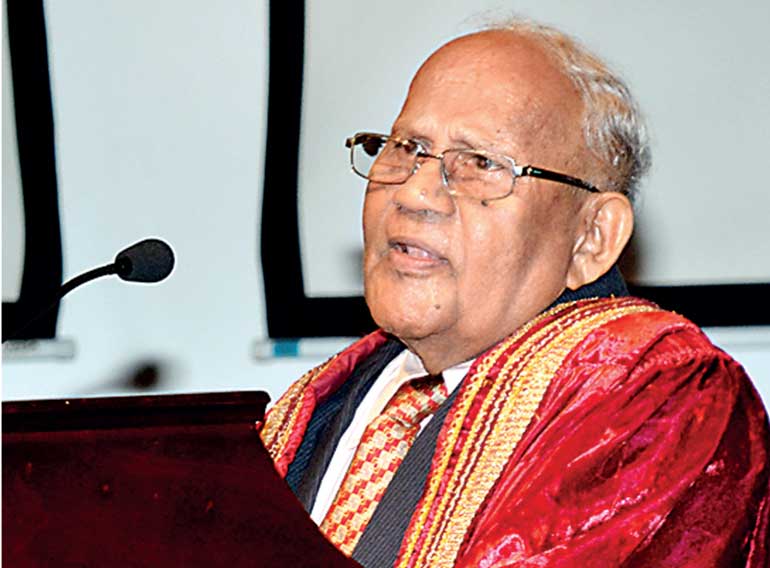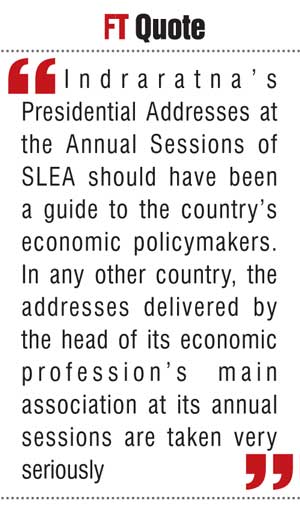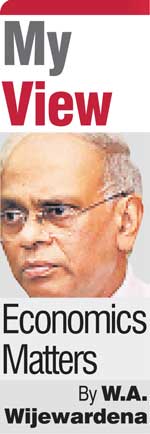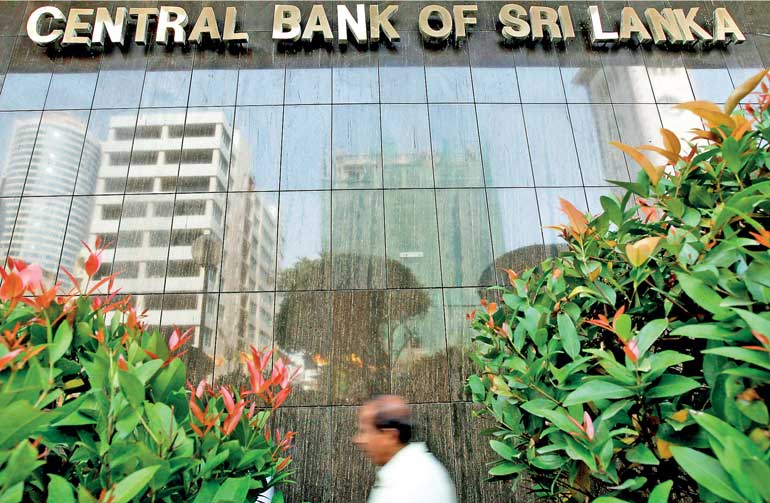Tuesday Feb 24, 2026
Tuesday Feb 24, 2026
Monday, 15 January 2018 00:10 - - {{hitsCtrl.values.hits}}
Pressure for Indraratna to withdraw his research findings
It was the presidential election time in 2010. The incumbent President after a five-year rule and a conclusive victory over the Northern rebels had sought another term. Given his popularity, the Opposition had a tough time to penetrate the voter base in the country. Hence, they used every trick in the book to attack the incumbent candidate.

Prof. A.D.V. de S Indraratna
One such trick was the castigation of the incumbent over the reported proliferation of corruption during his term. The source of the charge was a study conducted by Prof. A.D.V. de S Indraratna and three others in 2007 under the theme ‘The impact of corruption on poverty and economic growth’.
The report had quantified that public sector corruption was at 9% of GDP causing the country to lose 2% of growth every year. This was delicious food for the Opposition to attack the ruling administration and they used it liberally at every possible forum.
In a one-on-one discussion, Indraratna confessed to me sometime later: “I got a phone call from someone in the election campaign of the President. He wanted me to withdraw the findings of our report in an open media conference. He even said that the Government would arrange all the media houses to cover the event. I refused and he was not happy. He hinted at in a threatening tone that I would have to pay a high price for my stubbornness. I didn’t budge to the pressure.”
Unceremonious exit from the Monetary Policy Advisory Committee
The price came after the election. By then, Indraratna had completed three years as the Chairman of the newly-established Monetary Policy Advisory Committee at the Central Bank. It was a voluntary job he had performed without any remuneration.

He said: “I got a letter from the Governor of the Central Bank immediately after the election informing me that the bank was considering the restructuring of the Committee. Hence, I was to take note of the fact that my services were no longer needed.” I asked him whether he did not protest against this sudden decision by the bank. He said: “No, I didn’t, though I knew that it was not for restructuring the Committee. That was a ruse used because except me, all other members continued to serve the Committee. Why should I betray my values for a position?”
Anyone else would have yielded to pressure and betrayed his values. But this was Indraratna and he was of a different species.
Unwelcome independent economic analyses
His unwillingness to yield to pressure and become a mouthpiece of the Government in power was a trait which Indraratna had inherited from birth. His outspokenness about the frail economic policies being pursued by the Government in power from 2005 made him a bad boy.
Though he was the President of the only powerful body of economists, the Sri Lanka Economic Association (SLEA) from 2004, the Government chose not to engage him or the SLEA for economic policymaking exercises. He delivered many useful messages from the chair of the presidency of the SLEA at its annual sessions or special conferences organised by it. They all fell on deaf ears.
Even the new government that came to power in 2015 promising economic democracy and policy transparency kept a distance from Indraratna or his body, the SLEA. It pretended that there was no such body as SLEA. It was most noticeable when the new government hosted the Sri Lanka Economic Summit in January 2016 in collaboration with Harvard University’s Center for International Development and the US-based George Soros Foundation.
At the summit, there were many economists, both local and foreign. But a notable absentee was Indraratna or any member of SLEA participating in the summit in his official capacity. But this did not deter Indraratna from doing what he was required to do as an independent economist or the head of the powerful body of economists in the country.
Guru of Gurus
Indraratna had been guru to many thousands of students passing out from the University of Ceylon in the 1950s and 1960s and those who passed out from the University of Colombo in the 1970s and 1980s. Many of his students ended up as professors of economics at universities, top bureaucrats in the government and top managers of the country’s banking system. Hence, he was considered the Guru of Gurus. I was able to write on this aspect of Indraratna’s contributions in my series on Sri Lanka’s top economists (available at: http://www.dailymirror.lk/article/Professor-Indraratna-Guru-of-gurus-122476.html ).
I did not have the chance of studying under Indraratna formally. But he was my guru in a different sense. I learned the ABCs of economics from his textbook on microeconomics titled ‘Mila Nyaya’ or Price Theory in the mid-1960s. I began to meet him in person when I was appointed to the newly-established University of Ceylon, Colombo as a clerk in 1969.
At the new university, Indraratna was the Dean of the Faculty of Social Sciences in addition to being the Professor and Head of the Department of Economics there.

Undertaking the reform of degree programs
After his sabbatical leave at the University of East Anglia, UK, he had returned to Sri Lanka with a head full of new ideas to reform the new university. I had to work very closely with him in the new reforms introduced to the university’s academic programs. I used this to discuss economics and economic issues with him and thus he became my non-formal guru.
After joining the Central Bank, I had a very close relationship with Indraratna, who had now retired from the university. Our relationship helped us to learn of each other’s views on economic issues and learn from each other.
A three-year majoring and minoring degrees
The reform he introduced to the new university’s Faculty of Social Sciences had not been tried anywhere else in Sri Lanka. The traditional four-year special degree offered by other universities was converted to a three-year degree with a majoring subject; the general degree that had been offered by other universities continued as a minoring degree.
Thus, students completing the majoring degree could leave the university after three years and were qualified to compete with special graduates who had spent four years to acquire their degrees. Accordingly, several of his students joined the Central Bank in a fast-track mode and some ended up even as Deputy Governors.
A fourth-year BPhil degree
He also introduced a second degree, similar to the degree program at Oxford University, in the fourth year for students completing the majoring degree. That was a postgraduate degree titled the Bachelor of Philosophy or BPhil based on both coursework and a minor dissertation. It was equivalent to a one-year Master’s Degree offered by other universities.
Though many students opted to complete the BPhil degree after completing the majoring degree, it was not a requirement; they could join the job market one year ahead of their counterparts specialising in subjects in other universities.
Reversing Indraratna’s reforms by his successors
This was a way to minimise the costs without compromising the quality of the degrees and would have been followed by other universities as well. Had it happened, the government would have got more for each rupee it would spend on higher education in the country.
But unfortunately, after Indraratna left the university service, the successor to the University of Ceylon, Colombo, the University of Colombo, reverted to the old method of offering a three-year general degree and a four-year special degree.
Indraratna’s reforms were therefore aborted by the mid-1980s. All universities in the UK and many other parts of the world offer today a similar three-year special degree and an honours degree in the fourth year. Yet, Sri Lanka’s universities are still stuck in the 1940s.
The ignored SLEA Presidential Addresses
Indraratna’s Presidential Addresses at the Annual Sessions of SLEA should have been a guide to the country’s economic policymakers. In any other country, the addresses delivered by the head of its economic profession’s main association at its annual sessions are taken very seriously.
Once they are delivered, they are debated in public, analysed and assessed by university academics, reviewed in class assignments by students and used as the main seed ingredients for subsequent policy research. For instance, when the American Economic Association or AER conducts its annual sessions, for months universities in North America and the UK prepare their students for the oncoming event. Students are advised to be vigilant on the President’s address and other papers to be presented at the sessions.
The pet topic being discussed by university dons teaching economics in classes as well as in corridors of those universities invariably revolves around AER proceedings. Everyone tries to be ahead of the others with respect to his reading of the outcome of the proceedings.

The failing homo economicus
But that is not the case with Sri Lanka. University academics teaching economics at universities pay scant attention to SLEA proceedings. The media does not give sufficient coverage to what happens at those events. The public, as usual, show a strange aloofness to anything ‘economic’, though they are categorised as a species known as ‘Homo economicus’ or ‘Economic Man’.
Thus, economists as well as non-economists do not think that economic issues are important for them to be concerned with. This apathy on the part of the public is demonstrated by the poor response they have shown to articles analysing economic issues published in newspapers. The internet editions of these newspapers have opened opportunities for the public to get engaged in discussions and debates.
Yet the comments section relating to these articles is usually left blank though the open invitation has been for readers ‘to leave a comment’. It appears that economic issues are mostly relegated to studying for examinations and after those examinations they are conveniently forgotten.
Releasing SLEA Presidential Addresses in book form
Revising and updating his Presidential Addresses at annual sessions of SLEA for 10 years, he released a book titled ‘Policy Issues for Sustained Development of Sri Lanka’ in 2014. It enabled interested readers and even those who were engaged in policy research to have access to his addresses as a ready reference.
This does not mean that readers should necessarily agree with Indraratna. They can bring his addresses to a free debate, agree or dissent with him or even refute him. For whatever the intellectual enterprise one may wish to have, all his addresses were made available in a single place in printed form. According to the preface, the book was addressed to the relevant authorities or policymakers and relevant public officials who were engaged in policymaking.
Indraratna: The liberal thinker
What was Indraratna’s economic philosophy? His presidential addresses revealed several facets of his economic thinking.
He was a centre-rightist, believer in the private sector and free enterprise, advocate of free trade and integration to world economy, campaigner for inclusive growth and equity in sharing wealth and respecter of individual freedom, liberty and rule of law. He was politically neutral being able to serve governments of different complexions provided such governments subscribed to his economic values which have been tempered through decades of hard-thinking and conviction.
He thus found it difficult to amend his ways to suit the rhythms and pulses of people in power. As a result, given the current political and public policy culture in Sri Lanka which does not accommodate alternative views, it was hard for Indraratna to play any useful role in influencing the evolution of the country’s economic policy thinking.
His short stint as a member of the Economic Policy Council under the Mahinda Rajapaksa administration too ended up with no concrete results. Another member of the Council confided in me that the administration viewed Indraratna as a troublemaker since he was opposed to the trade and exchange rate policy of the Government. Hence, according to the member, the Council instead of firing Indraratna chose not to meet. This was despite the fact that the leading figure at the Council happened to be a one-time student of Indraratna.
Legacy in economics
Indraratna left this world a year ago and his death anniversary falls on 18 January. He left a legacy in Sri Lanka’s economics teaching. He successfully built a strong network of economists in the country. He had the obsession of contributing to knowledge creation in the country. He was obstinately independent. That was the message he left to the future intellectuals of the country.
(W.A. Wijewardena, a former Deputy Governor of the Central Bank of Sri Lanka, can be reached at [email protected]).